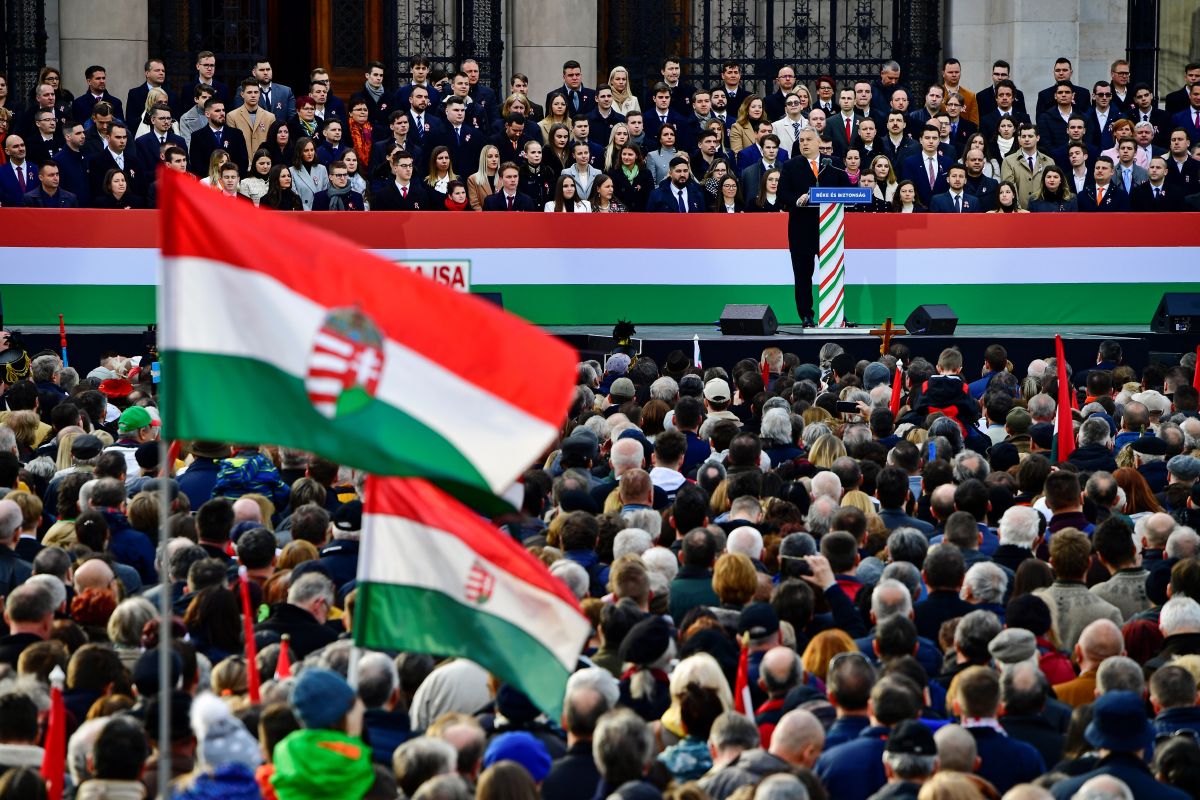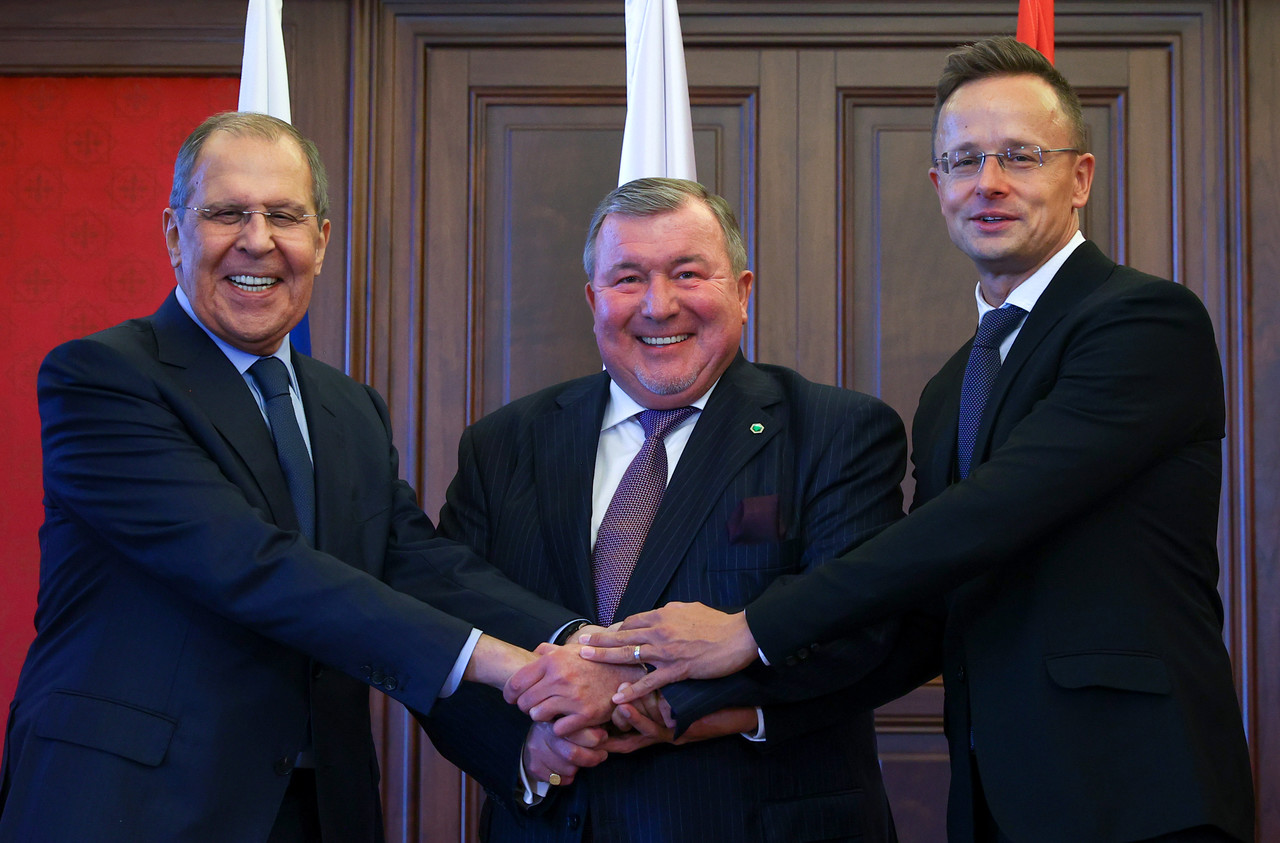Elections in Hungary Overshadowed by Russia's Aggression Against Ukraine
Growing support for Fidesz at the end of the campaign proves the ruling party has effectively mobilised undecided voters before the elections on 3 April. It has better presented its interpretation of the Russian aggression against Ukraine and its significance for Hungary than the united opposition, as the war has become the main topic of the campaign on both sides. Regardless of the outcome, the new government will face serious challenges in its economy and others related to Hungary’s dependence on Russia.
 MARTON MONUS/ Reuters/ FORUM
MARTON MONUS/ Reuters/ FORUM
Polls from the end of March show that Fidesz has an advantage of a few percentage points over the joint list of the united opposition. According to the Medián institute, the sides have the support of 40% and 32%, respectively, of all eligible voters. The opposition parties that are running on their own, including the far-right Our Homeland and the mocking Two-Tailed Dog Party, are not exceeding the 5% electoral threshold. About 20% of voters were undecided for several months. Research indicates an upward trend in the popularity of Fidesz, with unchanging support for the opposition bloc. This means that Russia’s invasion of Ukraine and the Hungarian government’s response to it have rather consolidated than divided the Fidesz electorate.
Bad Election Practices, Unequal Chances
In Hungary’s mixed electoral system, 106 single-mandate constituencies are of key importance, as more seats can be obtained from them than from the party lists (a total of 199 seats are to be divvied up in the unicameral legislature). Moreover, according to the electoral law passed by Fidesz in 2011, winning in a constituency means additional votes for the winner’s list. As a result, even a relatively small advantage in the number of votes won translates into a significant advantage in the number of seats awarded. According to the surveys, Fidesz also leads in the number of constituencies. The opposition has a good chance of winning in about 30 of them, and in another 20 the result is difficult to predict. However, it is estimated that it would have to win in at least 55-60 constituencies to win the elections. This is due in part to the disproportionate constituency boundaries drawn in 2011 (in terms of the number of voters and political preferences), which was favourable to Fidesz in the last two elections.
Hungarian electoral law is not only beneficial to Fidesz but also increases the risk of fraud. This has been highlighted by the OSCE, which in its assessment of the 2018 parliamentary elections claimed that it was free but did not provide equal opportunities to all participating parties. In a new report from mid-March, issued during the long-term election observation mission in Hungary, the OSCE indicated that its recommendations issued after the last elections have remained largely unaddressed. It stressed that the lack of regulations on the use of public funds in the campaign by the government and the systemic bias of the public media remains a problem. It also indicated that the inability to cast a postal ballot by voters who have a residence in the country but are abroad on the day of the elections, may violate the principle of equal suffrage rights. It also drew attention to the possible fraud resulting from the limited safeguards with regard to postal voting in which Hungarian citizens without a residence in the country are eligible to take part.
Campaign and Election Programmes
Russia’s attack on Ukraine changed the main theme of the campaign, which has been dominated by the war and the government’s and opposition’s reactions to it. As a result, a referendum initiated by the government that will be conducted alongside the parliamentary elections has lost importance. In Fidesz’s rhetoric, the referendum concerns the protection of children, but the content of its four questions (such as “Are you in favour of popularizing gender-changing surgery among minors?”) indicates the original intention to use it to build the campaign around controversy over LGBTQ+ issues.
The government’s message about Russia’s actions was formed even before the invasion, and boils down to the idea that Hungary must remain out of the conflict. An important motive of the Fidesz campaign is maintaining low energy prices provided by cheap Russian gas. In this way, the authorities explain their lack of support for Ukraine in the form of weapon deliveries or consent to the transport of lethal aid through Hungarian territory—including airspace—as well as opposing the idea of EU sanctions on the import of Russian energy resources. At the same time, according to a Republikon institute survey, the majority of the population believes that Hungary should help Ukraine (63%) and that Hungary’s allies are in the West, not in the East (57%).
The government-controlled public and other pro-government media continue to cover events in Ukraine while using Russian disinformation. They disseminate anti-U.S., anti-Ukraine, and anti-EU content that dilutes Russia’s sole responsibility for starting the war. On the other hand, these outlets altered the portrayal of Hungary’s relations with Russia to one which in essence is that they have always been solely economic contacts. This contradicts the building of close political ties with Russia in recent years and the presentation in Hungarian media of that country—and Vladimir Putin—only in a positive light until the invasion. On the other hand, the President Volodymyr Zelensky of Ukraine was the subject of a campaign of mockery by government and affiliated media after he called on Prime Minister Viktor Orbán during the European Council on 23 March to clearly define which side Hungary is on.
At the same time, Fidesz, as in previous years, does not have a formal election programme. The promises made in the campaign are the continuation of current policy and what it calls protection against the “left”, meaning the opposition, which it slanders by falsely presenting its goals. The ruling party strengthens its popularity with significant budget transfers, including tax reimbursement for people bringing up children, a pension supplement, as well as regulated prices of some food products and gasoline. This has resulted in an increase in the national debt, which by February had already reached nearly half of the annual target.
In turn, the opposition indicates in its campaign that the government does not take a firm stand on the side of Ukraine and its allies. It presents the stakes of the elections as maintaining the country’s belonging to Western structures and preventing further rapprochement, along with similarity to eastern authoritarian states. Therefore, in foreign policy, the opposition’s priority is to restore confidence in Hungary in NATO and the EU by confirming its commitment to deepening European integration and fulfilling allied obligations. The opposition announced a shift in relations with Russia by purging Hungary of its influence. To this end, the opposition would suspend the construction plans for a new nuclear power plant at the Paks facility until the terms of the contract with Russia are revised. It also highlights the need to oppose Chinese influence-building attempts. In European politics, the opposition would strive for a greater degree of integration of Hungary in the EU, suggesting it would adopt the euro within five years, join the European Public Prosecutor’s Office, and support the reinforcement of the EU’s social pillar and the expansion of the energy union.
The opposition’s message about Hungary’s international orientation is intertwined with other themes, including criticism of corruption in government and claims of mismanagement of the pandemic. Another important message is that Fidesz rule has led to economic problems and the suspension of EU funds. That is why, in the electoral programme published at the end of February, the united opposition lists the fight against systemic corruption first among its plans. It also announces the adoption—after social consultations and a referendum—of a new constitution, new media regulations protecting freedom of speech, and the restoration of local governments’ independence in terms of finances and competences.
Conclusions and Perspectives
A few days before the elections, the probability of a Fidesz victory is increasing. Its media advantage and extensive party structures enable it to mobilise more effectively in individual constituencies, which may ensure its electoral success. The electoral law changes put in place by Fidesz also gives it a better chance. Mistakes by the opposition may also contribute to a ruling party victory, such as the lack of simple slogans and a coherent message, which hinders reaching voters. At the same time, it is difficult to predict to what extent the authorities’ siding with Russia despite the war and the associated growing isolation of Hungary in the EU may affect the preferences of the undecided part of society, the majority of which expresses attachment to the West, understood as a Euro-Atlantic community. Popular dissatisfaction with high prices is also favourable to the opposition.
Polls exclude the victory of either party gaining the two-thirds constitutional majority that Fidesz has had with short breaks since 2010. This will make the situation of the new government more difficult, with the arbitrary adoption of constitutional changes, frequent in recent years, becoming impossible. Regardless of the election result, the coming years will be very difficult for the government, including the need to fight high inflation and reduce debt incurred by the pre-election social transfers. Another challenge will be Hungary’s energy dependence on Russia and its weakened position in the EU and NATO resulting from its reluctance to help Ukraine.





